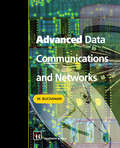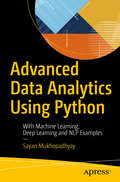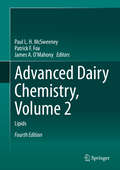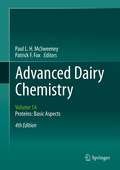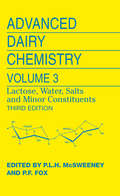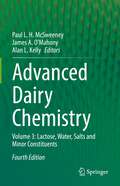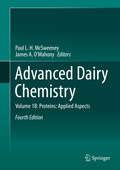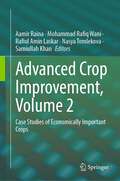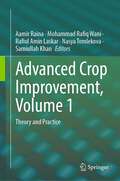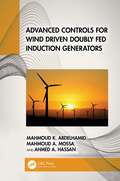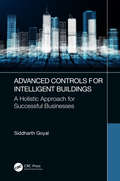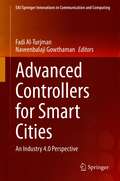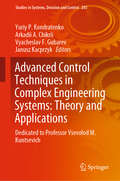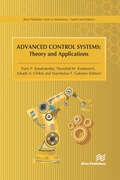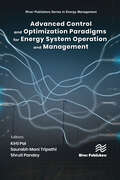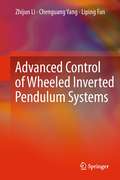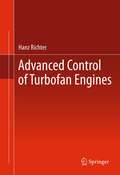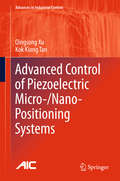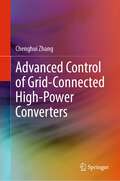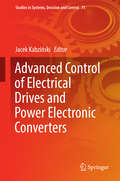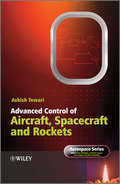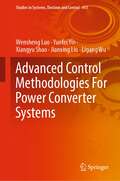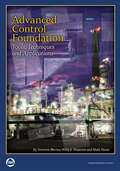- Table View
- List View
Advanced Data Converters
by Gabriele ManganaroNeed to get up to speed quickly on the latest advances in high performance data converters? Want help choosing the best architecture for your application? With everything you need to know about the key new converter architectures, this guide is for you. It presents basic principles, circuit and system design techniques and associated trade-offs, doing away with lengthy mathematical proofs and providing intuitive descriptions upfront. Everything from time-to-digital converters to comparator-based/zero-crossing ADCs is covered and each topic is introduced with a short summary of the essential basics. Practical examples describing actual chips, along with extensive comparison between architectural or circuit options, ease architecture selection and help you cut design time and engineering risk. Trade-offs, advantages and disadvantages of each option are put into perspective with a discussion of future trends, showing where this field is heading, what is driving it and what the most important unanswered questions are.
Advanced Data Communications and Networks
by Bill BuchananThe use of data communications and computer networks is constantly increasing, bringing benefits to most of the countries and peoples of the world, and serving as the lifeline of industry. Now there is a textbook that discusses data communications and networking in a readable form that can be easily understood by students who will become the IS professionals of the future.Advanced Data Communications and Networks provides a comprehensive and practical treatment of rapidly evolving areas. The text is divided into seven main sections and appendices:"General data compression"Video, images, and sound"Error coding and encryption"TCP/IP and the Internet"Network operating systems"LANs/WANs"Cables and connectorsOther topics include error detection/correction, image/video compression, digital video, digital audio, TCP/IP, HTTP, electronic mail, HTML, Windows NT, NetWare, UNIX, Fast Ethernet, ATM, FDDI, and much more.Written by a respected academician who is also an accomplished engineer, this textbook uses the author's wide practical experience in applying techniques and theory toward solving real engineering problems. It also includes an accompanying Web site that contains software, source code, and other supplemental information.
Advanced Data Analytics Using Python: With Machine Learning, Deep Learning and NLP Examples
by Sayan MukhopadhyayGain a broad foundation of advanced data analytics concepts and discover the recent revolution in databases such as Neo4j, Elasticsearch, and MongoDB. This book discusses how to implement ETL techniques including topical crawling, which is applied in domains such as high-frequency algorithmic trading and goal-oriented dialog systems. You’ll also see examples of machine learning concepts such as semi-supervised learning, deep learning, and NLP. Advanced Data Analytics Using Python also covers important traditional data analysis techniques such as time series and principal component analysis. <p><p> After reading this book you will have experience of every technical aspect of an analytics project. You’ll get to know the concepts using Python code, giving you samples to use in your own projects.
Advanced Dairy Chemistry, Volume 2: Lipids
by Paul L. H. McSweeney Patrick F. Fox James A. O’MahonyThe Advanced Dairy Chemistry series was first published in four volumes in the 1980s (under the title Developments in Dairy Chemistry) and revised in three volumes in the 1990s and 2000s. The series is the leading reference on dairy chemistry, providing in-depth coverage of milk proteins, lipids, lactose, water and minor constituents.Advanced Dairy Chemistry Volume 2: Lipids, Fourth Edition, is unique in the literature on milk lipids, a broad field that encompasses a diverse range of topics, including synthesis of fatty acids and acylglycerols, compounds associated with the milk fat fraction, analytical aspects, behavior of lipids during processing and their effect on product characteristics, product defects arising from lipolysis and oxidation of lipids, as well as nutritional significance of milk lipids.In the years since the publication of the third edition there have been significant developments in milk lipids and these are reflected in changes to this volume. Most topics included in the third edition are retained in the current edition, which has been updated; in some cases, new authors have given their perspective on certain topics. Chapters on nutritional significance of dairy lipids have been considerably revised.This authoritative work summarizes current knowledge on milk lipids and suggests areas for further work. It will be very valuable to dairy scientists, chemists and others working in dairy research or in the dairy industry.
Advanced Dairy Chemistry: Volume 1A: Proteins: Basic Aspects, 4th Edition
by Patrick F. Fox Paul L. McsweeneyProfessor Fox’s multi-volume Advanced Dairy Chemistry set was first published in four volumes in the early 1980s. A second edition came out in the early 1990s, and an updated third edition was published a decade later. The set is the leading major reference on dairy chemistry, providing in-depth coverage of milk proteins, lipids, and lactose. The editors propose beginning the revision cycle again, with a revised first volume on proteins, to be divided and published separately as Volume 1A - Proteins: Basics Aspects, and Volume 1B – Applied Aspects. Fox and his co-editor, Paul McSweeney, have created an extensively revised the Table of Contents for Volume 1A, which details the novel and updated chapters to be included in this upcoming fourth edition. New contributors include highly regarded dairy scientists and scholars from around the world.
Advanced Dairy Chemistry: Volume 3: Lactose, Water, Salts and Minor Constituents
by Paul L. McSweeney Patrick F. FoxThe Advanced Dairy Chemistry series was first published in four volumes in the 1980s (under the title Developments in Dairy Chemistry) and revised in three volumes in the 1990s. The series is the leading reference source on dairy chemistry, providing in-depth coverage of milk proteins, lipids, lactose, water and minor constituents. Advanced Dairy Chemistry Volume 3: Lactose, Water, Salts, and Minor Constituents, Third Edition, reviews the extensive literature on lactose and its significance in milk products. This volume also reviews the literature on milk salts, vitamins, milk flavors and off-flavors and the behaviour of water in dairy products. Most topics covered in the second edition are retained in the current edition, which has been updated and expanded considerably. New chapters cover chemically and enzymatically prepared derivatives of lactose and oligosaccharides indigenous to milk. P.L.H. McSweeney Ph.D. is Associate Professor of Food Chemistry and P.F. Fox Ph.D., D.Sc. is Professor Emeritus of Food Chemistry at University College, Cork, Ireland.
Advanced Dairy Chemistry: Volume 3: Lactose, Water, Salts and Minor Constituents
by Paul L. H. McSweeney James A. O’Mahony Alan L. KellyThe Advanced Dairy Chemistry series was first published in four volumes in the 1980s (under the title Developments in Dairy Chemistry) and revised in three volumes in the late 1990s and again in the 2000s and 2010s. For nearly four decades, the series has been the leading reference source on dairy chemistry and is now in its fourth edition. Advanced Dairy Chemistry Volume 3: Lactose, Water, Salts, and Minor Constituents, fourth edition, reviews the extensive literature on lactose and its significance in milk products. This volume also reviews the literature on milk salts, vitamins, and the behaviour of water in dairy products and the physical properties of milk. Most topics covered in the third edition are retained in the current edition, which has been updated and expanded considerably. New chapters cover chemically and enzymatically prepared derivatives of lactose and oligosaccharides indigenous to milk and some chapters from earlier editions are consolidated.
Advanced Dairy Chemistry: Volume 1B: Proteins: Applied Aspects
by Paul L. Mcsweeney James A. O'MahonyThe chemistry and physico-chemical properties of milk proteins are perhaps the largest and most rapidly evolving major areas in dairy chemistry. Advanced Dairy Chemistry-1B: Proteins: Applied Aspects covers the applied, technologically-focused chemical aspects of dairy proteins, the most commercially valuable constituents of milk. This fourth edition contains most chapters in the third edition on applied aspects of dairy proteins. The original chapter on production and utilization of functional milk proteins has been split into two new chapters focusing on casein- and whey-based ingredients separately by new authors. The chapters on denaturation, aggregation and gelation of whey proteins (Chapter 6), heat stability of milk (Chapter 7) and protein stability in sterilised milk (Chapter 10) have been revised and expanded considerably by new authors and new chapters have been included on rehydration properties of dairy protein powders (Chapter 4) and sensory properties of dairy protein ingredients (Chapter 8). This authoritative work describes current knowledge on the applied and technologically-focused chemistry and physico-chemical aspects of milk proteins and will be very valuable to dairy scientists, chemists, technologists and others working in dairy research or in the dairy industry.
Advanced Crop Improvement, Volume 2: Case Studies of Economically Important Crops
by Aamir Raina Mohammad Rafiq Wani Rafiul Amin Laskar Nasya Tomlekova Samiullah KhanAs per the reports of FAO, the human population will rise to 9 billion by the end of 2050 and 70% of more food must be produced over the next three decades to feed the additional population. The breeding approaches for crop improvement programs are dependent on the availability and accessibility of genetic variation, either spontaneous or induced by the mutagens. Plant breeders, agronomists, and geneticists are under constant pressure to expand food production by employing innovative breeding strategies to enhance yield, adaptability, nutrition, resistance to biotic and abiotic stresses. In conventional breeding approaches, introgression of genes in crop varieties is laborious and time-consuming. Nowadays, new innovative plant breeding techniques such as molecular breeding and plant biotechnology, supplement the traditional breeding approaches to achieve the desired goals of enhanced food production. With the advent of recent molecular tools like genomics, transgenics, molecular marker-assisted back-crossing, TILLING, Eco-TILLING, gene editing, CRISPR CAS, non-targeted protein abundant comparative proteomics, genome wide association studies have made possible mapping of important QTLs, insertion of transgenes, reduction of linkage drags, and manipulation of genome. In general, conventional and modern plant breeding approaches would be strategically ideal for developing new elite crop varieties to meet the feeding requirement of the increasing world population.This book highlights the latest progress in the field of plant breeding, and their applicability in crop improvement. The basic concept of this 2-volume work is to assess the use of modern breeding strategies in supplementing the conventional breeding toward the development of elite crop varieties, for obtaining desired goals of food production.
Advanced Crop Improvement, Volume 1: Theory and Practice
by Aamir Raina Mohammad Rafiq Wani Rafiul Amin Laskar Nasya Tomlekova Samiullah KhanAs per the reports of FAO, the human population will rise to 9 billion by the end of 2050 and 70% of more food must be produced over the next three decades to feed the additional population. The breeding approaches for crop improvement programs are dependent on the availability and accessibility of genetic variation, either spontaneous or induced by the mutagens. Plant breeders, agronomists, and geneticists are under constant pressure to expand food production by employing innovative breeding strategies to enhance yield, adaptability, nutrition, resistance to biotic and abiotic stresses. In conventional breeding approaches, introgression of genes in crop varieties is laborious and time-consuming. Nowadays, new innovative plant breeding techniques such as molecular breeding and plant biotechnology, supplement the traditional breeding approaches to achieve the desired goals of enhanced food production. With the advent of recent molecular tools like genomics, transgenics, molecular marker-assisted back-crossing, TILLING, Eco-TILLING, gene editing, CRISPR CAS, non-targeted protein abundant comparative proteomics, genome wide association studies have made possible mapping of important QTLs, insertion of transgenes, reduction of linkage drags, and manipulation of genome. In general, conventional and modern plant breeding approaches would be strategically ideal for developing new elite crop varieties to meet the feeding requirement of the increasing world population.This book highlights the latest progress in the field of plant breeding, and their applicability in crop improvement. The basic concept of this 2-volume work is to assess the use of modern breeding strategies in supplementing conventional breeding toward the development of elite crop varieties, for obtaining desired goals of food production.
Advanced Controls for Wind Driven Doubly Fed Induction Generators
by Mahmoud K. Abdelhamid Mahmoud A. Mossa Ahmed A. HassanAdvanced Controls for Wind Driven Doubly Fed Induction Generators discusses the most advanced control algorithms used for enhancing the dynamics of a doubly fed induction generator (DFIG) operating at fixed and variable speeds, and which are used for different utilization purposes (standalone and grid connection). Extensive generator performance analysis has been introduced using various control topologies. Features: Presents modeling of wind energy conversion systems (WECS), including a wind turbine as a prime mover, a DFIG as a generation unit for electrical energy, and a three-phase induction motor as an isolated load Explores a detailed description for the presented control algorithms in order to visualize the base principle of each method Introduces a comprehensive performance analysis for the DFIG using the formulated predictive voltage control scheme and other control techniques under different operating conditions Examines the formulation of new control approaches which overcome the shortages present in previous DFIG control schemes Presents a detailed comparison between different control topologies for the DFIG to outline the most effective procedure in terms of dynamic response, structure simplicity, ripples, total harmonic distortion, and computational burdens The book is written for researchers and academics working on advanced control systems and those interested in areas such as machine drives, renewable energy systems, 'adaptive control', modeling of WECS, and optimization theory.
Advanced Controls for Intelligent Buildings: A Holistic Approach for Successful Businesses
by Siddharth GoyalThis book focuses primarily on both technical and business aspects needed to select, design, develop and deploy control application (or product) successfully for multiple components in building systems. Designing and deploying a control application require multiple steps such as sensing, system dynamics modelling, algorithms, and testing. This may involve choosing an appropriate methodology and technique at multiple stages during the development process. Understanding the pros and cons of such techniques, most importantly being aware of practically possible approaches in the entire ecosystem, is critical in choosing the best framework and system application for different parts of building systems. Providing a wide overview of the state-of art in controls and building systems, providing guidance on developing an end-to-end system in relation to business fundamentals (distribution channels, stakeholders, marketing, supply-chain and financial management), the book is ideal for fourth-year control/mechanical/electrical engineering undergraduates, graduate students, and practitioners including business leaders concerned with smart building technology.
Advanced Controllers for Smart Cities: An Industry 4.0 Perspective (EAI/Springer Innovations in Communication and Computing)
by Fadi Al-Turjman Naveenbalaji GowthamanThis book provides basic knowledge of advanced microcontrollers associated with large systems and devices. The book determines the feasibility of the advanced controllers from an Industry 4.0 perspective, which is associated with Integrated Internet of Things (IIoT) when developing larger smart cities. Also, it describes potential applications, key areas of Industry 4.0, and controlling applications with microcontrollers. Chapters include IoT with integrated control applications in smart city paradigm; agriculture, public safety, women and child care & welfare; healthcare, water management, government and administration; environmental impact, energy with management of information systems; and safety, education, transportation systems with advanced controllers.
Advanced Control Techniques in Complex Engineering Systems: Dedicated to Professor Vsevolod M. Kuntsevich (Studies in Systems, Decision and Control #203)
by Yuriy P. Kondratenko Arkadii A. Chikrii Vyacheslav F. Gubarev Janusz KacprzykThis book presents an authoritative collection of contributions by researchers from 16 different countries (Austria, Chile, Georgia, Germany, Mexico, Norway, P.R. of China, Poland, North Macedonia, Romania, Russia, Spain, Turkey, Ukraine, the United Kingdom and United States) that report on recent developments and new directions in advanced control systems, together with new theoretical findings, industrial applications and case studies on complex engineering systems. This book is dedicated to Professor Vsevolod Mykhailovych Kuntsevich, an Academician of the National Academy of Sciences of Ukraine, and President of the National Committee of the Ukrainian Association on Automatic Control, in recognition of his pioneering works, his great scientific and scholarly achievements, and his years of service to many scientific and professional communities, notably those involved in automation, cybernetics, control, management and, more specifically, the fundamentals and applications of tools and techniques for dealing with uncertain information, robustness, non-linearity, extremal systems, discrete control systems, adaptive control systems and others. Covering essential theories, methods and new challenges in control systems design, the book is not only a timely reference guide but also a source of new ideas and inspirations for graduate students and researchers alike. Its 15 chapters are grouped into four sections: (a) fundamental theoretical issues in complex engineering systems, (b) artificial intelligence and soft computing for control and decision-making systems, (c) advanced control techniques for industrial and collaborative automation, and (d) modern applications for management and information processing in complex systems. All chapters are intended to provide an easy-to-follow introduction to the topics addressed, including the most relevant references. At the same time, they reflect various aspects of the latest research work being conducted around the world and, therefore, provide information on the state of the art.
Advanced Control Systems: Theory and Applications (Studies In Systems, Decision And Control Ser. #203)
by Yuriy P. Kondratenko Vsevolod M. Kuntsevich Arkadii A. Chikrii Vyacheslav F. GubarevAdvanced Control Systems: Theory and Applications provides an overview of advanced research lines in control systems as well as in design, development and implementation methodologies for perspective control systems and their components in different areas of industrial and special applications.It consists of extended versions of the selected papers presented at the XXV International Conference on Automatic Control “Automatics 2018” (September 18-19, 2018, Lviv, Ukraine) which is the main Ukrainian Control Conference organized by Ukrainian Association on Automatic Control (National member organization of IFAC) and Lviv National University “Lvivska Politechnica”. More than 100 papers were presented at the conference with topics including: mathematical problems of control, optimization and game theory; control and identification under uncertainty; automated control of technical, technological and biotechnical objects; controlling the aerospace craft, marine vessels and other moving objects; intelligent control and information processing; mechatronics and robotics; information measuring technologies in automation; automation and IT training of personnel; the Internet of things and the latest technologies.The book is divided into two main parts, the first concerning theory (7 chapters) and the second concerning applications (7 chapters) of advanced control systems. The first part “Advances in Theoretical Research on Automatic Control” consists of theoretical research results which deal with descriptor control impulsive delay systems, motion control in condition of conflict, inverse dynamic models, invariant relations in optimal control, robust adaptive control, bio-inspired algorithms, optimization of fuzzy control systems, and extremal routing problem with constraints and complicated cost functions. The second part “Advances in Control Systems Applications” is based on the chapters which consider different aspects of practical implementation of advanced control systems, in particular, special cases in determining the spacecraft position and attitude using computer vision system, the spacecraft orientation by information from a system of stellar sensors, control synthesis of rotational and spatial spacecraft motion at approaching stage of docking, intelligent algorithms for the automation of complex biotechnical objects, an automatic control system for the slow pyrolysis of organic substances with variable composition, simulation complex of hierarchical systems based on the foresight and cognitive modelling, and advanced identification of impulse processes in cognitive maps.The chapters have been structured to provide an easy-to-follow introduction to the topics that are addressed, including the most relevant references, so that anyone interested in this field can get started in the area. This book may be useful for researchers and students who are interesting in advanced control systems.
Advanced Control & Optimization Paradigms for Energy System Operation and Management
by Kirti Pal Saurabh Mani Tripathi Shruti PandeyDistributed energy technologies are gaining popularity nowadays; however, due to the highly intermittent characteristics of distributed energy resources, a larger penetration of these resources into the distribution grid network becomes of major concern. The main issue is to cope with the intermittent nature of the renewable sources alongside the requirements for power quality and system stability. Unlike traditional power systems, the control and optimization of complex energy systems comprising of wind, solar, thermal, and energy storage becomes difficult in many aspects, such as modelling, integration, operation, coordination and planning etc. This means that energy conversion as per the standards imposed by the energy market is unachievable without adequate control, management, and optimization.This edited book serves as a resource for the engineers, scientists and professionals working on distributed energy systems. The book is an extensive collection of state-of-the-art studies on advanced control paradigms for complex energy systems, with emphasis on the optimization and management of the high penetration of distributed energy resources into power distribution networks. Readers will find the book inspiring and useful whilst carrying out their own research in distributed energy systems.Key features • An extensive collection of state-of-the-art studies on advanced control paradigms for complex energy systems.• Emphasis on the optimization and management of high penetration of distributed energy resources into power/energy distribution networks.• Serves as a valuable resource for engineers, scientists, academicians, experienced professionals, and research scholars who are working in management of energy systems.
Advanced Control of Wheeled Inverted Pendulum Systems
by Chenguang Yang Zhijun Li Liping FanAdvanced Control of Wheeled Inverted Pendulum Systems is an orderly presentation of recent ideas for overcoming the complications inherent in the control of wheeled inverted pendulum (WIP) systems, in the presence of uncertain dynamics, nonholonomic kinematic constraints as well as underactuated configurations. The text leads the reader in a theoretical exploration of problems in kinematics, dynamics modeling, advanced control design techniques and trajectory generation for WIPs. An important concern is how to deal with various uncertainties associated with the nominal model, WIPs being characterized by unstable balance and unmodelled dynamics and being subject to time-varying external disturbances for which accurate models are hard to come by. The book is self-contained, supplying the reader with everything from mathematical preliminaries and the basic Lagrange-Euler-based derivation of dynamics equations to various advanced motion control and force control approaches as well as trajectory generation method. Although primarily intended for researchers in robotic control, Advanced Control of Wheeled Inverted Pendulum Systems will also be useful reading for graduate students studying nonlinear systems more generally.
Advanced Control of Turbofan Engines
by Hanz RichterAdvanced Control of Turbofan Engines describes the operational performance requirements of turbofan (commercial) engines from a controls systems perspective, covering industry-standard methods and research-edge advances. This book allows the reader to design controllers and produce realistic simulations using public-domain software like CMAPSS: Commercial Modular Aero-Propulsion System Simulation, whose versions are released to the public by NASA. The scope of the book is centered on the design of thrust controllers for both steady flight and transient maneuvers. Classical control theory is not dwelled on, but instead an introduction to general undergraduate control techniques is provided. Advanced Control of Turbofan Engines is ideal for graduate students doing research in aircraft engine control and non-aerospace oriented control engineers who need an introduction to the field.
Advanced Control of Piezoelectric Micro-/Nano-Positioning Systems (Advances in Industrial Control)
by Kok Kiong Tan Qingsong XuThis book explores emerging methods and algorithms that enable precise control of micro-/nano-positioning systems. The text describes three control strategies: hysteresis-model-based feedforward control and hysteresis-model-free feedback control based on and free from state observation. Each paradigm receives dedicated attention within a particular part of the text. Readers are shown how to design, validate and apply a variety of new control approaches in micromanipulation: hysteresis modelling, discrete-time sliding-mode control and model-reference adaptive control. Experimental results are provided throughout and build up to a detailed treatment of practical applications in the fourth part of the book. The applications focus on control of piezoelectric grippers. Advanced Control of Piezoelectric Micro-/Nano-Positioning Systems will assist academic researchers and practising control and mechatronics engineers interested in suppressing sources of nonlinearity such as hysteresis and drift when combining position and force control of precision systems with piezoelectric actuation.
Advanced Control of Grid-Integrated Renewable Energy Power Plants: LMI-based Design in the Takagi-Sugeno Framework (IEEE Press)
by Horst SchultePresents the principles, derivations, and equations of renewable energy power plants, including MATLAB code Advanced Control of Grid-Integrated Renewable Energy Power Plants presents a comprehensive introduction to the power system dynamics and stability of renewable energy power plants (RPPs), such as wind turbines, wind power plants, and photovoltaic systems. The author—a noted expert on the topic—takes a rigorous approach to the analysis and modelling of RPPs, such as turbine rotors, PV cells, electronic converters, transformers, and aggregated grid models. This approach allows for the validation of requirements for sustainable power systems based on formal methods. The text deals with nonlinear model-based observer and control design techniques in the Takagi-Sugeno (TS) framework. It explores the Takagi-Sugeno fuzzy (TSF) models which are nonlinear systems, in which the consequent part of a fuzzy rule is a mathematical formula, representing local dynamics or limited nonlinearities by sector functions. The strong property of the TSF finds several applications modelling dynamical systems that can be described by differential equations. The book’s practical exercises use MATLAB code to help model simulation models of single large-scale wind turbines, wind farms, and photovoltaic plants. This important book: Provides a complete introduction to the power system dynamics and stability of renewable energy power plants Includes a detailed discussion of how to design model model-based controllers for RPPs Takes a rigorous approach to the analysis and modelling of RPPs, including turbine rotors, PV cells, electronic converters, transformers, aggregated grid models, and more Includes MATLAB code to model simulation models of single large-scale wind turbines, wind farms, and photovoltaic plants Written for students and researchers of renewable energy, Advanced Control of Grid-Integrated Renewable Energy Power Plants offers an authoritative text to the topic.
Advanced Control of Grid-Connected High-Power Converters
by Chenghui ZhangThe high-power grid-connected converters play a vital role in modern power system, realizing the conversion and transmission of electrical energy, and determining its safety, stability and efficiency. This book explores the advanced control strategies of high-power grid-connected converter to satisfy the high-power requirements in practical applications. Special attention is given to grid-connected converter modules in parallel operation to overcome the challenges of non-ideal power grid, power switches faults, and circulating current. Through the advanced control strategies presented in this book, the power capacity of grid-connected converter is flexibly increased with high-reliability and efficiency, thus expanding the application range of high-power converters in modern power system. To facilitate understanding, this book provides step-by-step model derivation and controller design for grid-connected converter. Meanwhile, it also provides the comprehensive simulation and experimental results to offer readers a deep insight into the control process of grid-connected converters. This book serves as a guide for electrical engineers and researchers involved in the development of high-power converters.
Advanced Control of Electrical Drives and Power Electronic Converters (Studies in Systems, Decision and Control #75)
by Jacek KabzińskiThis contributed volume is written by key specialists working in multidisciplinary fields in electrical engineering, linking control theory, power electronics, artificial neural networks, embedded controllers and signal processing. The authors of each chapter report the state of the art of the various topics addressed and present results of their own research, laboratory experiments and successful applications. The presented solutions concentrate on three main areas of interest: · motion control in complex electromechanical systems, including sensorless control; · fault diagnosis and fault tolerant control of electric drives; · new control algorithms for power electronics converters. The chapters and the complete book possess strong monograph attributes. Important practical and theoretical problems are deeply and accurately presented on the background of an exhaustive state-of the art review. Many results are completely new and were never published before. Well-known control methods like field oriented control (FOC) or direct torque control (DTC) are referred as a starting point for modifications or are used for comparison. Among numerous control theories used to solve particular problems are: nonlinear control, robust control, adaptive control, Lyapunov techniques, observer design, model predictive control, neural control, sliding mode control, signal filtration and processing, fault diagnosis, and fault tolerant control.
Advanced Control of Aircraft, Spacecraft and Rockets
by Ashish TewariAdvanced Control of Aircraft, Spacecraft and Rockets introduces the reader to the concepts of modern control theory applied to the design and analysis of general flight control systems in a concise and mathematically rigorous style. It presents a comprehensive treatment of both atmospheric and space flight control systems including aircraft, rockets (missiles and launch vehicles), entry vehicles and spacecraft (both orbital and attitude control). The broad coverage of topics emphasizes the synergies among the various flight control systems and attempts to show their evolution from the same set of physical principles as well as their design and analysis by similar mathematical tools. In addition, this book presents state-of-art control system design methods - including multivariable, optimal, robust, digital and nonlinear strategies - as applied to modern flight control systems.Advanced Control of Aircraft, Spacecraft and Rockets features worked examples and problems at the end of each chapter as well as a number of MATLAB / Simulink examples housed on an accompanying website at http://home.iitk.ac.in/~ashtew that are realistic and representative of the state-of-the-art in flight control.
Advanced Control Methodologies For Power Converter Systems (Studies in Systems, Decision and Control #413)
by Ligang Wu Jianxing Liu Yunfei Yin Wensheng Luo Xiangyu ShaoThis book aims to present some advanced control methodologies for power converters. Power electronic converters have become indispensable devices for plenty of industrial applications over the last decades. Composed by controllable power switches, they can be controlled by effective strategies to achieve desirable transient response and steady-state performance, to ensure the stability, reliability and safety of the system. The most popular control strategy of power converters is the linear proportional–integral–derivative series control which is adopted as industry standard. However, when there exist parameter changes, nonlinearities and load disturbances in the system, the performance of the controller will be significantly degraded. To overcome this problem, many advanced control methodologies and techniques have been developed to improve the converter performance. This book presents the research work on some advanced control methodologies for several types of power converters, including three-phase two-level AC/DC power converter, three-phase NPC AC/DC power converter, and DC/DC buck converter. The effectiveness and advantage of the proposed control strategies are verified via simulations and experiments. The content of this book can be divided into two parts. The first part focuses on disturbance observer-based control methods for power converters under investigation. The second part investigates intelligent control methods. These methodologies provide a framework for controller design, observer design, stability and performance analysis for the considered power converter systems.
Advanced Control Foundation: Tools, Techniques and Applications
by Terrence Blevins Mark Nixon Willy K. WojsznisIn this book, the authors address the concepts and terminology that are needed to apply advanced control techniques in the process industry. The book is written for the process or control engineer that is familiar with traditional control but has little or no experience in designing, installing, commissioning and maintaining advanced control applications. Each chapter of the book is structured to allow a person to quickly understand the technology and how it is applied. Application examples are used to show what is required to address an application. Also, a section of each chapter is dedicated to a more in-depth discussion of the technology for the reader that is interested in understanding the mathematical basis for the technology. A workshop is provided at the end of each chapter that explores the technology. The reader may view the workshop solution by going to the web site that accompanies the book. The book provides comprehensive coverage of the major advanced control techniques that are most commonly used in the process industry. This includes tools for monitoring control system performance, on-demand and adaptive tuning techniques, model predictive control, LP optimization, data analytics for batch and continuous processes, fuzzy logic control, neural networks and advancements in PID to use with wireless measurements. Since many readers may work with an existing DCS that does not support advanced control, a chapter of the book is dedicated to tools and techniques that the authors have found useful in integrating advanced control tools into an existing control system. Also, one chapter of the book addresses how dynamic process simulations may be easily created in a DCS to support checkout and operator training on the use of advanced control.

